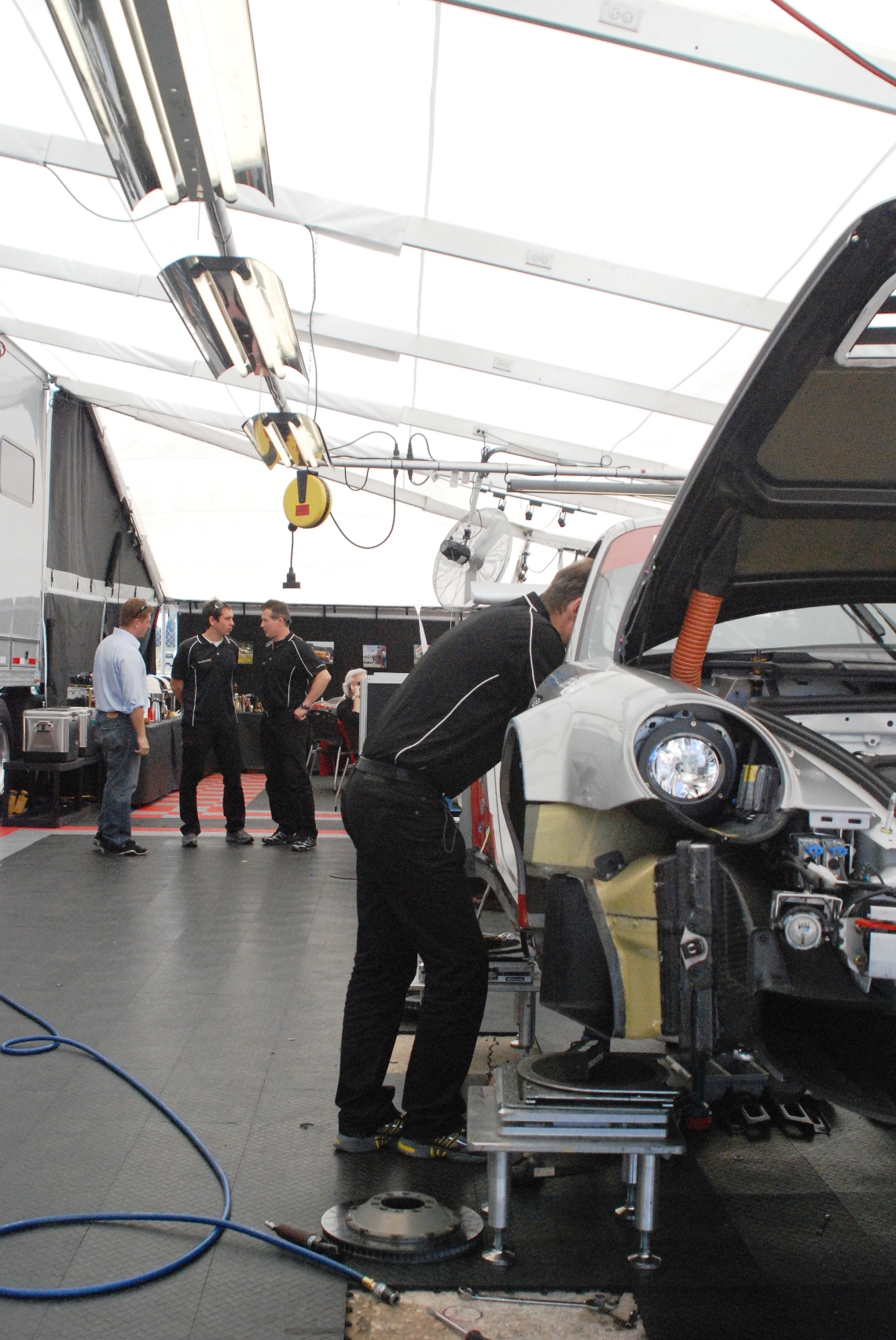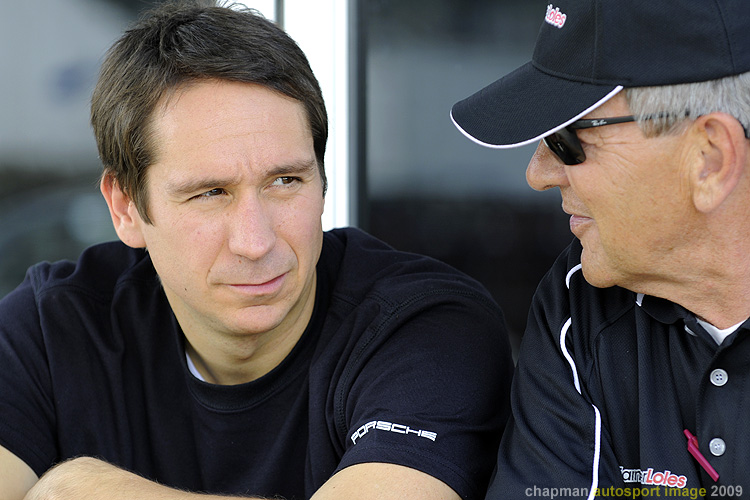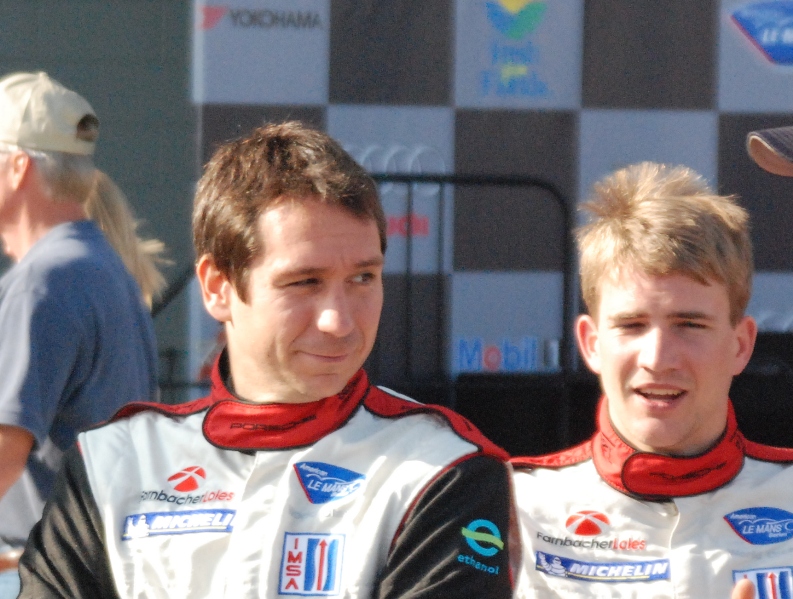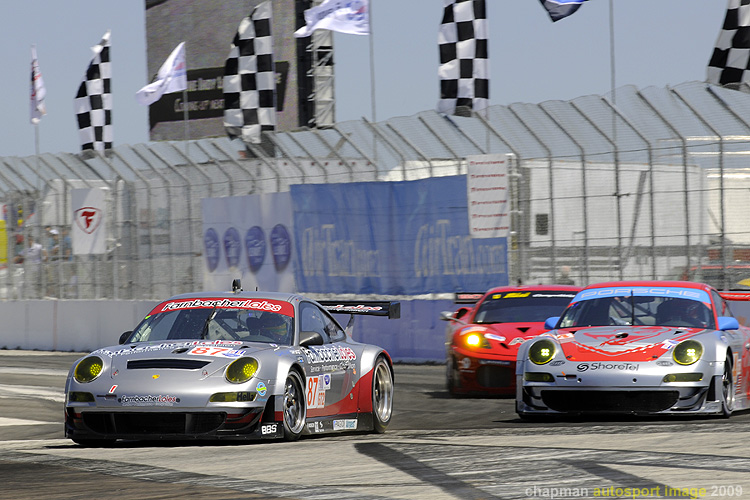For the 12-Hrs of Sebring weekend, the track becomes its own nation: the paddock and surrounding areas are filled to the brim with race fans in the most festive of moods. RVs and a variety of vehicles cram the parking areas full, making transit in and out of the venue a slow and laborious process. Food and alcohol are readily available, air-horns are de rigueur, and the 12 hour race does not lack a passionate, alert and vocal audience, even toward the 11th hour. It is a great place to be, not just for the energy of the racing, but for people-watching.
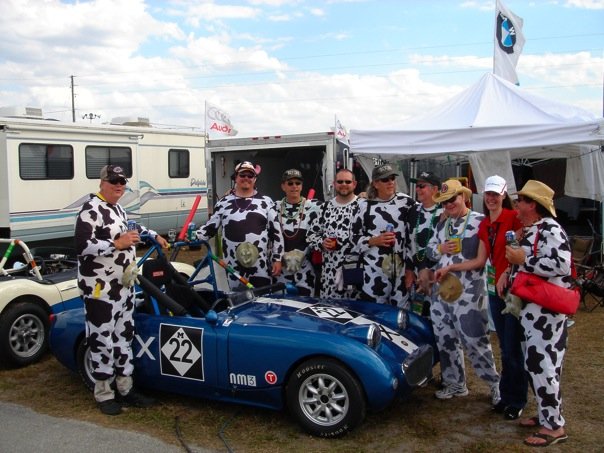
It is impossible to walk a few yards without seeing someone related to the racing world, and this adds to the social atmosphere of the place. One moment we spied Mario Theissen, BMW Motorsport Director and team principal of BMW Sauber F1, texting on his phone. Moments later, a lapis blue Bentley made its way past the crowds; at the wheel was driving legend Derek Bell chauffeuring a young child past us (we waved, but the kid promptly put the window up).
The FlatSixes.com team arrived at Sebring on Friday, the day before the 12-hour race, just in time for our scheduled interview with FarnbacherLoles driver Wolf Henzler. Our biggest challenge was to make it past the bridge leading to the paddock. There’s no walking across allowed, so we were forced to wait for a slow-moving trolley. We decided then and there we would rely on the kindness of motorsport strangers for future crossings, and the plan worked! We got rides back and forth from a variety of friendly people, from official-looking Porsche guys to Chip Herr’s golf kart, among others.
We meet Wolf in front of the FarnbacherLoles team transporter. We walk past one of Farnbacher’s Porsches up on a lift, and after admiring the various parts slated to complete the race car, we choose a quiet corner away from the concessions and the traffic of fans wondering around the Sebring paddock. Quiet, that is, until the Formula Atlantic practice laps begin and our interview is punctuated by the beautiful sound of engines at work. The engine noise does not bother Wolf at all – it has been the soundtrack of his life for quite a while.
Born in Germany, Henzler first made his mark at age 15 when he won the Junior German Kart Championship, quickly following this win with two poles and two wins in formula ADAC and being named 1992 rookie of year. Between 1995-98, Henzler continued to win a total of nine times in Formula Three, and made the jump to the Porsche SuperCup in 2000. His relationship with Porsche has grown since then, culminating in his appointment as a Porsche Factory Driver in 2008.
When the cars come by, Wolf gingerly points out that we have about 2 minutes to answer each question (the time it takes for the cars to lap), then he gets to work answering our questions. He tells us he’s looking forward to the 12-hour race, where he is scheduled to hop in the car second, after Dirk Werner.
Like so many talented drivers before him, the love of cars ran in the Henzler family. “My dad raced, but not on a really professional level,” he tells us. Henzler, Sr. owned a BMW dealership and, as is the case with many young drivers, lacked the time and money to race professionally. Still, the passion was there: “after work, he would go in the workshop and prepare his racecar,” Wolf tells us, “and then on the weekend he would go racing.” Wolf also mentions his uncle Hermann, who (before Formula 1) raced in Formula 2 in the late seventies.
Surprisingly, it was neither his dad nor his uncle who ultimately steered Wolf toward a career in driving. “One year before I started racing, I did a trial race with a motorcycle.” He describes the test as one of driving control, where the rider climbs over hills or clears obstacles whilst riding. He continues to describe the event, adding, “you don’t go fast–it’s very slow but it’s all very technical.” Whilst participating in this event, Wolf noticed a kart track nearby and told his father about it when he got home.
“I came home and told my dad about the go-karts,” said Wolf, “and we found out when the go-karts had practice. We went [to the track] and my father recognized somebody who was there with his son.” The Henzlers charmed their way to borrow a kart, and the rest is history. Smiles Wolf, “yeah, [the kid] let me drive his kart a couple of laps and I enjoyed it. And then, that’s it, we bought a used go-cart and that’s how it started.”
His talent was immediately apparent, and by his second year racing he had won a championship and secured a sponsorship from ADAC (The German Automobile Association). “I got a formula BMW car from them, and this is how [I got] started in professional racing,” says Wolf.
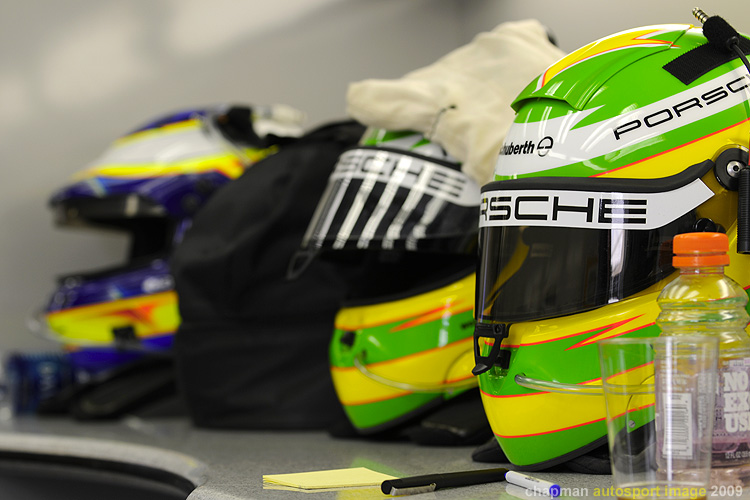 We ask Wolf how he came to partner with Porsche? Was there always an affinity, or did opportunities that manifested themselves lead him toward Porsche? “Before I did a SuperCup or a German Carrera Cup, I raced in Formula 3. After racing in this circuit, I knew I would not have the luck of getting into Formula 1, so I looked [to see] what opportunities I had. I saw the Porsche Super Cup and I decided [it was] a good series.”
We ask Wolf how he came to partner with Porsche? Was there always an affinity, or did opportunities that manifested themselves lead him toward Porsche? “Before I did a SuperCup or a German Carrera Cup, I raced in Formula 3. After racing in this circuit, I knew I would not have the luck of getting into Formula 1, so I looked [to see] what opportunities I had. I saw the Porsche Super Cup and I decided [it was] a good series.”
Porsche clearly grew on him, and several wins (Porsche SuperCup rookie of year in 2000, plus an impressive list of accomplishments in both the SuperCup and Carrera Cup in 2003 and being named SuperCup champion in 2004) probably helped his fondness for the brand. “I [drove] the Super Cup for a couple of years. And I really enjoyed driving a Porsche more and more. Finally, I made a step over to the US with Farnbacher Loles Racing Speed World Challenge racing and Rolex Series racing. Affirms Wolf, “Since then I’m driving a Porsche and I’m not missing anything–I enjoy driving a Porsche!” He surely enjoyed driving the Porsche in 2006, when he once again won the Porsche Cup.
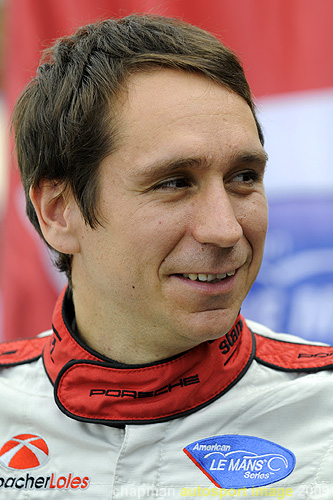 For the last two years, Wolf has held the coveted position of Porsche Factory Driver. For Wolf, a long relationship with Porsche led to the post. “I always had a good relationship [with] them, and then in ’07 we got closer and they started to talk about [a Factory Driver position] and finally they offered me a contract.” In his calm, humble demeanor, Wolf adds, “I say, ok, yeah that’s fine, that’s what I want to do.”
For the last two years, Wolf has held the coveted position of Porsche Factory Driver. For Wolf, a long relationship with Porsche led to the post. “I always had a good relationship [with] them, and then in ’07 we got closer and they started to talk about [a Factory Driver position] and finally they offered me a contract.” In his calm, humble demeanor, Wolf adds, “I say, ok, yeah that’s fine, that’s what I want to do.”
Aside from all the driving, Porsche Factory Drivers are expected to meet physical fitness standards. We ask Wolf about this detail, and he nods. “Yeah, they do a fitness camp for ten days in January or February. Two times a year, we go to Porsche doctors for a fitness check and they do quite a lot for your fitness. They help you, give you a plan–a schedule–on how you should train. I think that’s really good,” He affirms. While Wolf always kept in shape (he’s an avid mountain biker) he finds the plan provided by Porsche trainers “helps a lot.” The exercise is all well, but we want to know about diet. Are there restrictions? Wolf smiles again, “we had a meeting about foods but it’s not that we cannot eat some french fries or go to McDonalds –but we shouldn’t do [it] all day or everyday!”
European vs. American Race Circuits
We’re always curious about differences between the European and American race circuits, so we ask Wolf to give us his perspective. Although we mean for him to compare driving styles, Wolf offers up very interesting insight into American vs. European personalities.
“My first experience was when I came here [U.S.] and did my first race,” he begins. “All the drivers were new to me. I was surprised [to see that] before the race, we were joking and we were having fun…,” he smiles as he remembers, a bit wiser now. “The drivers [made me feel as if] I was welcome and we talked.” He thought to himself, “they are funny and it should be a good race.” The easygoing American style disarmed Henzler, who was relaxed by the time he got behind the wheel.
But Wolf quickly came to find out in the U.S., business and pleasure are two very distinct things. “In the race all of a sudden [things] changed and [the drivers] were very aggressive–not unfair–but really fighting,” he smiles. “And, yeah, I was really surprised about that, before the race they were easy [going], and then in the race, fighting,” which is not the case in Europe.
We ask him to elaborate. Are European drivers more business-like when they are not in the cars? Wolf nods. “Yeah–they’re easy, but not as easy-going and they don’t joke [around] as much as here.”
We move on to technical differences between Europe and the U.S. Like so many of his European counterparts, Wolf affirms circuits are “very bumpy like–like Sebring, for example!” he chuckles. He elaborates, “in Europe the circuits are really smooth [because] they resurface them, I don’t know, every three years or whatever and they are very nice. But [that] doesn’t mean that the circuits here in US are not good! Every circuit here is special. Because of the bumps it’s always challenging to find a set up for the car. It’s very difficult here in Sebring, for example.”
Also, Wolf tells us, he is more likely to find similarities between tracks in Europe than he is between American track. “The circuits here in the US they are all, to me, really different,” he says. “In Europe … I say ok, this part of the circuit is similar to another, [whereas] here in the US I don’t have the feeling they are similar, they all different.”
Porsche SuperCup
In 2004, Wolf was Porsche SuperCup champion and followed the victory with podiums at Petit Le Mans in the GT and Speed World Challenge categories, and winning the GT category at the Rolex 24 at Daytona, effectively making the’04-’05 a very good, strong season for the German. Wolf agrees. “Yeah, that was really good,” he smiles, “it was good winning the Super Cup in ’04 and then [having] two wins here in the U.S. Then we came over in ’05 and we won Daytona.” Such strong and consistent delivery helped cement Wolf’s reputation abroad, he affirms: “for sure it really helped me … because many people recognized me later in the season, they knew that I won Daytona, and that I won two Speed World Challenge races in ’04.”
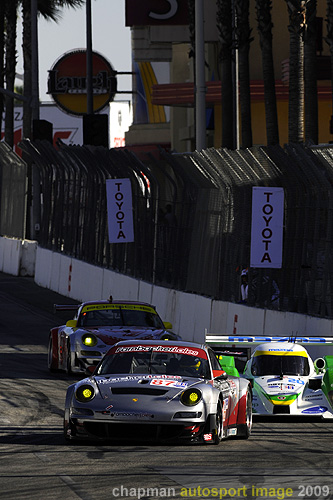 In his career, Wolf has driven a wide variety of cars from the Porsche RSR to the SuperCup to the Grand-Am spec GT3 Cup. “Between the RSR from Porsche, the biggest difference to a Cup car or the Grand-Am car is the aero; the GT has a better aero with more downforce and it’s wider, with different tires.”
In his career, Wolf has driven a wide variety of cars from the Porsche RSR to the SuperCup to the Grand-Am spec GT3 Cup. “Between the RSR from Porsche, the biggest difference to a Cup car or the Grand-Am car is the aero; the GT has a better aero with more downforce and it’s wider, with different tires.”
So, is downforce the biggest difference then? Wolf elaborates. “Yeah, more downforce…and, ok, more horsepower, but the tires are also different from Grand-Am… but it’s hard to compare the Michelins,” says Wolf, because a prototype, for example “needs something different than a Cup car.”
Does he have any interest in any prototype driving, whether it be a Daytona prototype or an LMP prototype? Ever the Porsche man, Wolf responds, “well, I’ve never done it–driven in a prototype—[I’ve just driven] Formula cars, but right now if there is a chance to drive for a prototype as long as it has a Porsche engine I wouldn’t say no!”
Wolf Henzler, The Personal Side
Here at FlatSixes.com, we like to learn more about the social side of the very talented drivers we’re lucky enough to interview. We put our questions to Wolf.
The Ride…For starters, what car does he drive off the track?
“I drive a Porsche Cayenne S,” he tells us, adding “I love this car. It’s [got] good handling, even [though] it’s a bigger car… and it has a big trunk to put my mountain bike in the car!” (Mr. Henzler is an avid mountain biker and soccer player).
iPod or no iPod? Does he listen to music before a race, or does he have any sort of pre-race ritual?
He nods his head no. “No, not before the race…no listening.”
No pre-race rituals, either. We ask why not?
“I didn’t want to get used to it because if I have something special and I have no time to do it or I forget to do it or whatever, and I’m sitting inside the race car and maybe–I don’t know–maybe start thinking about it and darnit I didn’t do it… so that’s why I say ok, I take it how it comes and nothing special.”
Schumi or no Schumi? We ask about his youth racing influences. Was he a Schumacher fan, for example?
“Yeah, for sure, I supported Michael Schumacher, when I was driving go-karts or later Formula cars. I mean I watched Formula 1 races, and if he won it was ok, but I was–how you say–I was not only for Michael Schumacher…”
Which one is left? Is there a race he’d like to win? Perhaps one that he has not yet entered, or one that has eluded him?
“I would like to win them all,” Wolf smiles, adding, “I raced here last year and I think this would be a race that I would really like to win.”
Best win…Which was your most memorable win?
“I think when we won in 2005, the Rolex 24 in Daytona, the GT class…I think that one.”
Special thanks to Wolf for taking the time to sit down with the FlatSixes.com team, Roger Garbow of FarnbacherLoles for setting things up and Bob Chapman of AutosportImage.com for the great images (the bad ones are soley my fault) 🙂
Interview by Christian Maloof / Story by Valerie Roedenbeck
Related Posts
Interview with Porsche’s Joerg Bergmeister
[Source: Valerie Roedenbeck, Christian Maloof, 993C4S]
